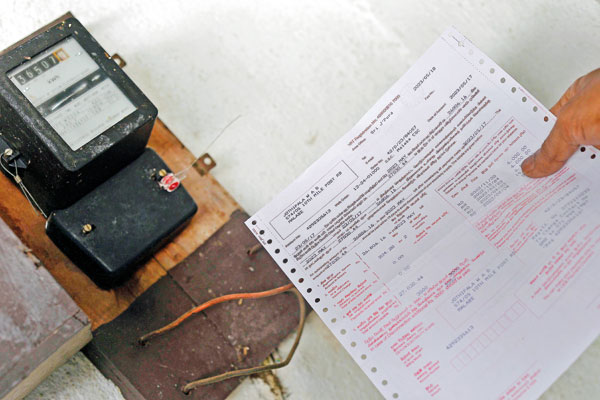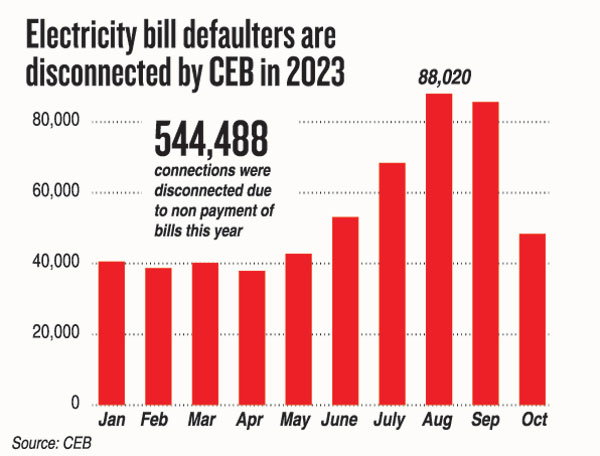News
CEB disconnects electricity to over 500,000 defaulters
View(s):By Tharushi Weerasinghe
More than 500,000 Ceylon Electricity Board customers have lost their electricity supply due to non-payment of bills as of October 2023.
According to CEB Media Spokesman Eng. Noel Priyantha, the disconnections happen following the 30-day credit period of usage along with approximately 10 days’ notice. “The criteria or disconnections vary sometimes based on areas and customer density,” he told the Sunday Times on Friday.

A sealed electricity meter due to unpaid bills. Pic by Eshan Fernando
Eng. Priyantha said the CEB’s action complied with Section 28, Schedule II, and Schedule III of the Sri Lanka Electricity Act. He said it was in alignment with the Statement of Rights and Obligations of Electricity Consumers (ROEC) and the Supply Services Code of the licensees (SSC). Moreover, the Electricity (Safety, Quality and Continuity) Regulations of 2016 (R) allow licensees to disconnect or discontinue electricity supply to any consumer failing to meet the requirements outlined in the legal frameworks.
“At the same time, the licensees should restore the electricity supply of those customers when they fulfil such requirements,” he added, noting that this system exists to ensure the assurance of standards and responsibilities related to electricity in the energy sector.
Over the last year, CEB tariffs have been revised three times to “cover the revenue-expenditure gaps envisaged at each revision.” The CEB estimated a Rs. 288 billion deficit at the prevailing tariff, which was revised with the expectation of a 66% revenue increase. A tariff reduction of 3.15% was proposed by the CEB during the second half of 2023 to pass on the benefit of cost reductions based on revised budgets to consumers. However, the Public Utilities Commission of Sri Lanka reduced the tariff by 14.5% instead.

According to Eng. Priyantha, this disparity resulted in the 18% tariff increase approved on October 20. The tariff revision also came on losses that were estimated to be around Rs. 18 billion as a result of the drought conditions at the time. However, this revision, too, was significantly lower than what the CEB had estimated initially.
In a letter from CEB General Manager Dr. Narendra de Silva to the PUCSL, the CEB recognised that actual energy consumption in September had been lower than expected, resulting in lower usage of private thermal power that saved the CEB Rs. 18.7 billion.
Eng. Priyantha attributed this reduction in thermal power consumption to the sudden change in weather patterns from extremely dry to wet.
Disconnection rates as a percentage of the number of users stand at 1.3% of the CEB’s 7 million customer base, according to Eng. Priyantha.
However, a list of long-overdue electricity bills of government institutions and politicians was released last year, causing public outcry over the concessions, including longer credit periods, enjoyed by politicians for bills much larger than those of the average consumer.
Eng. Priyantha noted that a number of these defaulters had paid their dues and that the CEB was in the process of recovering the rest of the receivables from these parties too.
The best way to say that you found the home of your dreams is by finding it on Hitad.lk. We have listings for apartments for sale or rent in Sri Lanka, no matter what locale you're looking for! Whether you live in Colombo, Galle, Kandy, Matara, Jaffna and more - we've got them all!

